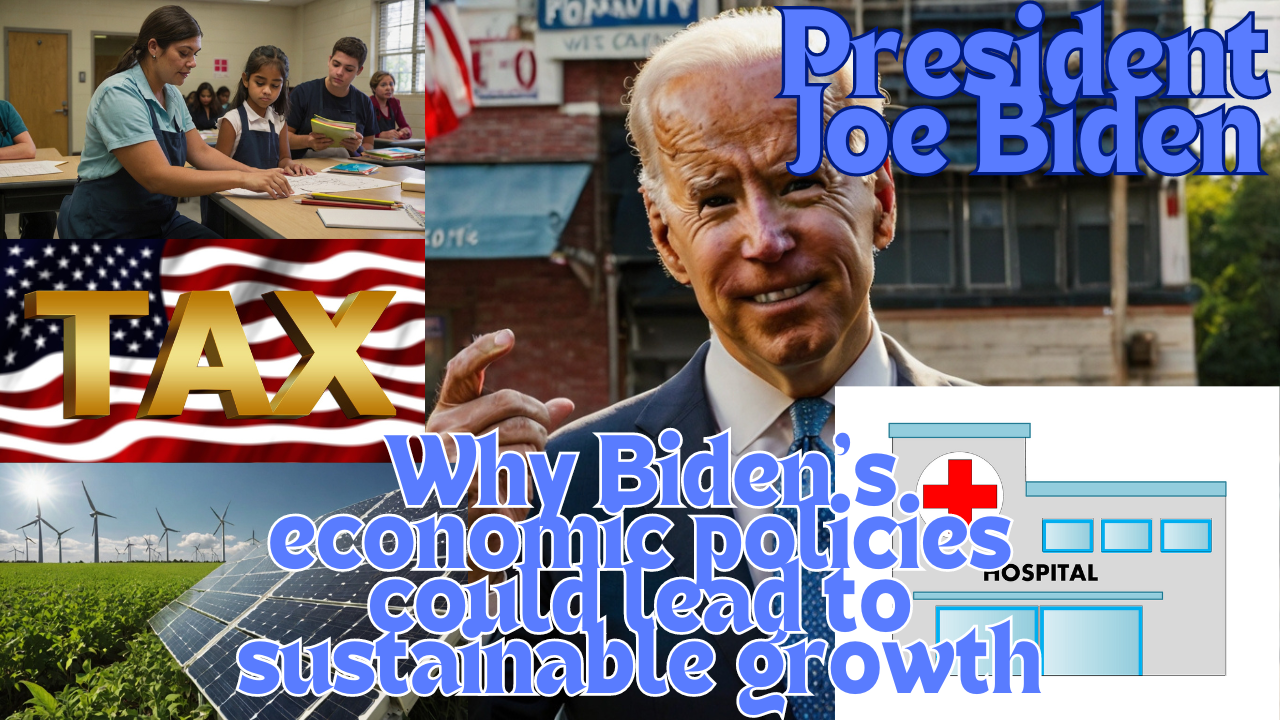Who Will Better Manage the Economy? Why Biden’s Economic Policies Could Lead to Sustainable Growth
The management of the economy is one of the most critical issues in any presidential election. As we approach the 2024 election, voters are keenly interested in understanding how each candidate’s economic policies will impact the nation’s future. This discussion and debate topic delves into why Joe Biden’s economic policies could potentially lead to sustainable growth, offering various perspectives and inviting robust debate on the merits and drawbacks of his approach.
Key Aspects of Biden’s Economic Policies
- Investment in Green Energy
- Argument for Biden: Biden’s focus on green energy investments aims to create new jobs, reduce dependence on fossil fuels, and combat climate change. These initiatives could spur innovation and long-term economic growth in emerging industries.
- Counterpoint: Critics argue that the transition to green energy could be costly and disruptive, potentially leading to job losses in traditional energy sectors.

Who Will Better Manage the Economy? Why Biden’s Economic Policies Could Lead to Sustainable Growth
The management of the economy is one of the most critical issues in any presidential election. As we approach the 2024 election, voters are keenly interested in understanding how each candidate’s economic policies will impact the nation’s future. This discussion and debate topic delves into why Joe Biden’s economic policies could potentially lead to sustainable growth, offering various perspectives and inviting robust debate on the merits and drawbacks of his approach.
Key Aspects of Biden’s Economic Policies
- Investment in Green Energy
- Argument for Biden: Biden’s focus on green energy investments aims to create new jobs, reduce dependence on fossil fuels, and combat climate change. These initiatives could spur innovation and long-term economic growth in emerging industries.
- Counterpoint: Critics argue that the transition to green energy could be costly and disruptive, potentially leading to job losses in traditional energy sectors.
2. Infrastructure Development
- Argument for Biden: Biden’s infrastructure plan includes significant funding for repairing and modernizing roads, bridges, and public transit. This investment is expected to boost economic activity, create jobs, and improve the efficiency of transportation networks.
- Counterpoint: Opponents contend that the funding for these projects could increase the national debt and lead to higher taxes, which might stifle economic growth.

- Support for Education and Workforce Development
- Argument for Biden: By investing in education and workforce development, Biden aims to equip workers with the skills needed for the jobs of the future. This focus on human capital could enhance productivity and competitiveness.
- Counterpoint: Some believe that government intervention in education and job training might not yield the desired outcomes and that private sector solutions could be more effective.
- Tax Policies
- Argument for Biden: Biden proposes raising taxes on the wealthy and corporations to fund social programs and reduce income inequality. Supporters argue that this approach will lead to a fairer economy and increased consumer spending.
- Counterpoint: Critics warn that higher taxes on businesses could discourage investment, reduce job creation, and slow economic growth.

- Healthcare Expansion
- Argument for Biden: Expanding access to affordable healthcare can reduce financial burdens on families, improve public health, and enhance economic productivity by ensuring a healthier workforce.
- Counterpoint: Opponents argue that expanding government-funded healthcare could be prohibitively expensive and lead to inefficiencies in the healthcare system.

Discussion and Debate Questions
- Green Energy Investments
- How realistic are Biden’s goals for green energy, and what are the potential economic benefits and drawbacks of transitioning to a green economy?
- Can the job losses in fossil fuel industries be offset by new jobs in green energy? How can this transition be managed effectively?
- Infrastructure Development
- What are the short-term and long-term economic impacts of Biden’s infrastructure plans? Are there better ways to fund these projects without increasing the national debt?
- How can we ensure that infrastructure investments lead to sustainable economic growth rather than just temporary boosts?
- Education and Workforce Development
- How effective are Biden’s proposed investments in education and workforce development likely to be in preparing the workforce for future economic challenges?
- What role should the private sector play in education and workforce development compared to the government’s role?
- Tax Policies
- Will raising taxes on the wealthy and corporations lead to a more equitable economy and sustainable growth, or will it hinder business investment and job creation?
- How can we balance the need for funding social programs with the potential economic impacts of higher taxes?
- Healthcare Expansion
- What are the potential economic benefits of expanding access to affordable healthcare? How can we manage the costs associated with such expansion?
- Is there a way to improve healthcare access and affordability without significantly increasing government spending?
Conclusion
The debate over who will better manage the economy is a central issue in the 2024 presidential election. Biden’s economic policies, with their focus on green energy, infrastructure, education, fair taxation, and healthcare, offer a vision for sustainable growth. However, these policies also come with potential risks and criticisms. Engaging in a thorough discussion of these issues will help voters make informed decisions about which candidate’s economic approach aligns best with their vision


